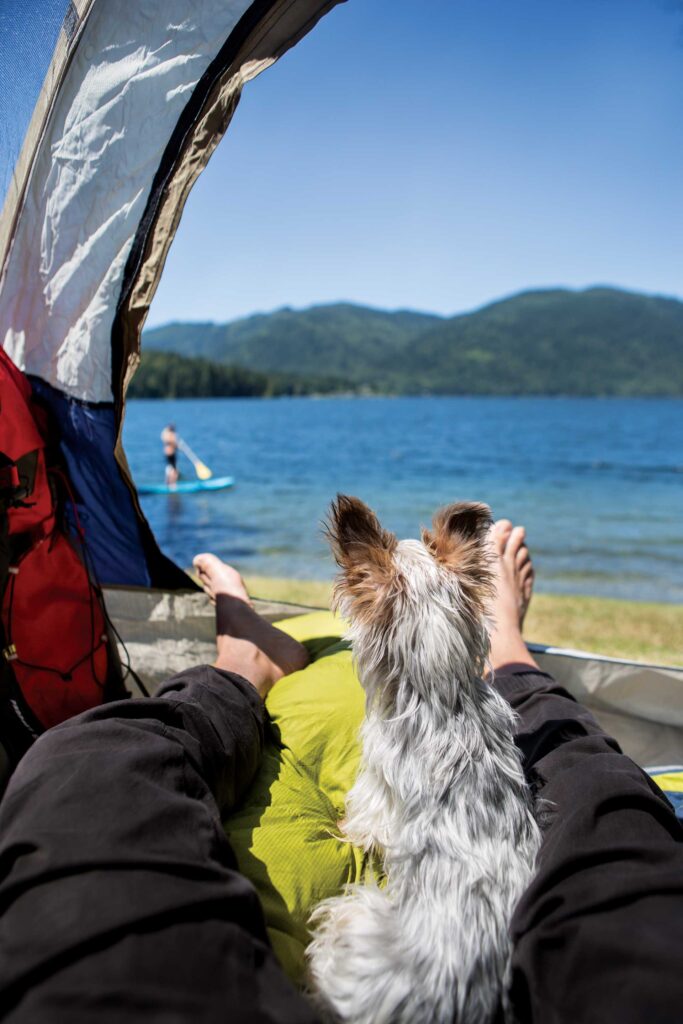Advertisement
Have Pet, Will Travel
Make vacationing with your pet a walk in the park

Back in 2012, I faced a huge dilemma. I was moving to Vancouver from the UK, which meant my beloved eight-year-old cocker spaniel, Freddie, would have to deal with a 10-hour flight in a crate in the hold. I was so anxious about how he’d cope.
I’m happy to say that with a lot of preparation, he breezed through the 15 or so hours that he was away from me, and now happily hops in his crate to come on long road trips around beautiful BC.
If you’re fretting about travelling with your pet for the first time or struggling with perennial pet travel problems, there are gentle training tactics and natural solutions that can help—and questions you should ask yourself.
Advertisement
Should they come?
It’s definitely possible to train your pet for travel, but your first thought should be: do they really need to come? Freddie definitely had to get on that plane, but I’d never put him through that again. Whenever I fly off on vacation, Freddie stays home with a sitter.
Vancouver-based homeopathic and holistic vet Shulamit Krakauer points out, “For older animals, change can be stressful. I have a 20-year-old cat, and I go the extra mile with sitters for her to make her comfortable.”
Advertisement
What will they need to travel?
Check with your vet well before you travel to make sure you have the correct paperwork for the country you’re visiting and the type of pet you have. Some airlines and countries may ask for a certificate of health from a vet.
TIP: Always check with the airline to see what sizes of pet crates it will allow.
If you’re driving across the border to the US, it’s worth remembering that your dog will need an up-to-date rabies vaccine. Border guards may not always ask to see proof, but if they do, you need that certificate. Cats don’t need a rabies vaccine to enter the US, but some individual states and other countries require it.
Advertisement
Will they enjoy this vacation?
Are you driving cross-country for a coastal or cottage break? It’s likely your dog would enjoy that kind of vacation (packed with long hikes and plenty of time hanging out in the countryside together) much more than a city break spent in a hotel room.
If it’s going to be a nautical holiday, try shorter boat trips first to determine if your pet enjoys being on the water. Remember that they should have a lifejacket on.
TIP: Consider your dog’s bladder at sea. You can buy a patch of real grass that is portable, biodegradable, and specially designed to be a natural bathroom for pets.
Advertisement
How do they do in the car?
“You need to get your pet used to being in a car for long periods,” advises Krakauer. “But just like humans, some animals are good travellers, and some get motion sickness. I’d recommend seeing how they handle a shorter trip first.”
If your pet gets sick, speak with your vet about treatments for motion sickness. Krakauer suggests dosing their water with natural anti-anxiety medication the day before and the day of the trip, as the nausea could be anxiety-related. She recommends a mixture of flower extracts formulated for pets, such as cherry plum and rock rose.
Don’t forget to take heat and hydration into account.
“Water is so important in the heat. Always take a travel bowl with you, and never let your pet overheat in a closed vehicle,” says Krakauer.
Advertisement
How can I help them emotionally?
Pets pick up on the emotions of their humans, so if you’re anxious about the trip, then your pet can get stressed out, too. Krakauer says this is when homeopathy can play a role in supporting the physical and emotional state of the animal.
“Aconite is a good remedy for acute fear and panic, which can be beneficial for animals who go into panic mode. Dose them 24 hours before travel to try to pre-empt any negative symptoms,” she says.
TIP: Always speak to your vet before trying new treatments for your pet.
Advertisement
Will their diet change during the trip?
Once you get to your holiday home, the last thing you want are accidents to clean up. “If you feed raw and want to switch to dehydrated or kibble foods for your trip, make sure you gradually change your pet’s food over a week or so before you go away,” cautions Krakauer.
TIP: No pet wants to make a mess of their crate; help them by giving them a light meal the night before a flight. Don’t feed them for six hours before the flight.
The no-tears guide to crate training your dog
The aim of careful crate training is for your dog to associate the crate with a safe space where nothing happens, so they calmly sleep there. This is the training program that worked for me and Freddie.
- Leave the door tied open so your dog can explore. Put a favourite cushion or rug down to make it cozy, and keep tossing treats inside so they associate it with good things. Stay away and leave your pet to discover this by themselves.
- Once your dog seems happy going in and out of the crate, start feeding them there. Still keep the door tied open, and if they’re not going all the way in, try moving their food bowl further toward the back of the crate each meal.
- After they’ve eaten in the crate a few times, it’s time to close the door. Do it just before they’ve finished and stay close by. Open the door straight away. Toss a favourite treat inside while you hold the door open. Add a few minutes in the crate each time.
- Once they’re comfortable, you can begin to leave them longer, perhaps with a favourite chew toy. It’s okay to walk away into another room, but walk back in and out, too. Don’t talk to your dog, but let them see you’re there.
Remember to
- give yourself a few weeks to get into the routine
- not open the crate when they’re whining, because they’ll assume howling means “Let me out!”
- only open the door when they’re quiet
- not make a fuss when they come out; keep things calm and low-key





